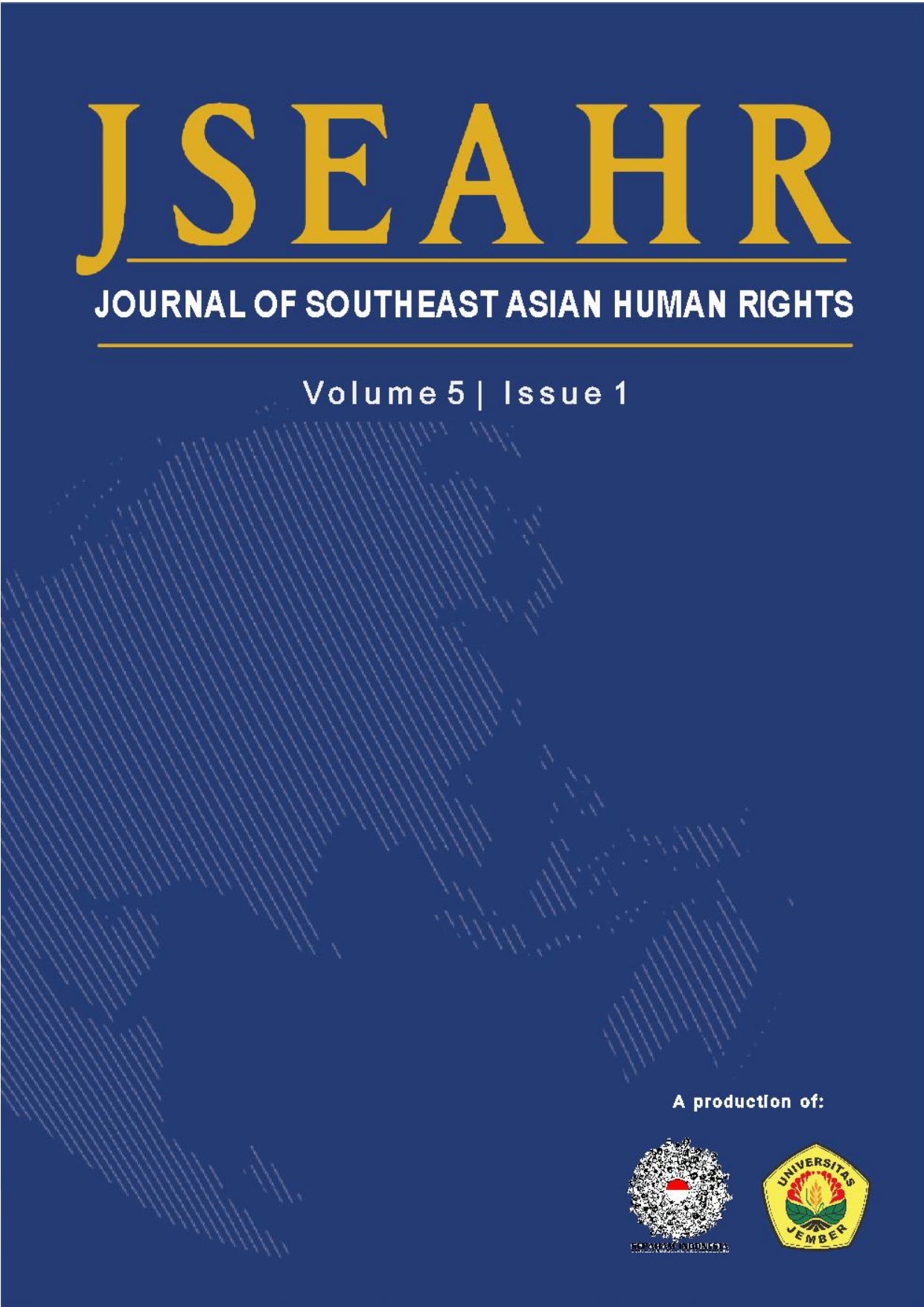Involvement of the Indonesian National Military (TNI) in Legislation about Anti-Terrorism
A Review of International Humanitarian Law
DOI:
https://doi.org/10.19184/jseahr.v5i1.18469Keywords:
Indonesian National Military (TNI), Anti-Terrorism, International Humanitarian LawAbstract
Changes in the international humanitarian legal system in a global context have shifted, as the first war identified with an inter-state ceasefire. Today, the war party is not only a state but also the aftermath of the 9/11 tragedy marked by non-state war actors, a terrorist attack. In Indonesia, the issue of terrorism becomes a serious concern after the first Bali Bombing, the second Bali Bombing, and other terrorist tragedies. Lately, the discourse of TNI involvement in the eradication of terrorism in Indonesia through the formation of the Anti-Terrorism Act. According to the issue, the research problems are (1) TNI's authority elements to combat terrorism in the Indonesian legal system; (2) the International humanitarian law system regulates the involvement of the military on combating terrorism. The results of the study are (1) after the fall of New Order regime in 1998, the dual function of ABRI (Indonesian Armed Forces during Suharto's era) had dissolved, and this implied the limited authority of TNI to maintain the unitary state of the Republic of Indonesia (NKRI) sovereignty at the border. The authority of the TNI on combating terrorism, following Act No.34, 2004 section 7 articles (3) about TNI, mentions that the fight against terrorism deals with criminal methods. Except for war aggression, related to terrorism that threatens the State sovereignty and not against terrorism that occurs in the community on the Anti-Terrorism Act. If TNI wants to be involved in combating terrorism, it must be following the 1945 constitution, of which terrorism is part of non-international armed conflict, in which the power of command is in the hands of the President.
Downloads
References
Alex P Schmid and Rashmi Singh, et.al, After War on Terror; Regional and Multilateral Perspectives on Counter-Terrorism Strategy (London: The Royal United Servics Institute, 2009).
Courtneh Hougham, et.al, A New Understanding of Terrorism; Case Studies, Trajectories, and Lesson Learned (London: Springer, 2009).
Derek Jins, et.al., Applying International Humanitarian Law in Judicial and Quasi-Judicial Bodie; International and domestic aspect. (New York: Springer, 2008).
Hikmahanto Juwana, et.al, Global Ant-Terrorism: Law and Policy (Cambridge: Cambridge University Press, 2005).
ICRC, Report Document: International Humanitarian Law and the Challanges of Contemporary armed conflict, document prepared by the ICRC for the 30th International Conference Volume 89 Number 867 September, 2007 (Geneva: ICRC, 2007).
I Wayan Parthiana. Hukum Pidana Internasional. (Bandung: Yrama Widya, 2006).
Jean-Marie Henckaerts & Loise Doswald-Beck, Customary International Humanitarian Law (Cambridge: Cambridge University Press, 2005).
Kontras, et.al, Kertas Posisi Koalisi SSR RUU Perubahan UU Terorisme (Jakarta: Kontras, 2018).
L. Ali Khan, A Theory of International Terrorism; Understanding Islamic Militancy. (Leiden: Martinus Nijhoff Publishing, 2006).
Jonathan T.Chow “ASEAN Counter-Terrorism Cooperation Since 9/11†(2005) 45 (2) JoAS Univ.California 302-321 at 305 (QL).
Leonard Weinberg, Democratic Responses to Terrorisem, (London: Routledge, 2008).
Malcom N Shaw, International Law (Cambridge: Cambridge University Press, 2008).
Marco Odello et.al. International Humanitarian Law and Human Right Law; Towards a new merger in international law. (Leiden: Martin Nijhoff Publishing, 2008)
Michael Crowley. Introduction to International Humanitarian Law & IHL Moot In Asia-Pasific Region. (Hong Kong City: ICRC Hong Kong, 2012).
Nigel D. White, et.al, Counter-Terrorism: International Law and Practice (Oxford University Press,2012).
Peter Mahmud Marzuki. Penelitian hukum. (Jakarta: Kencana Prenada Group, 2005).
Rhona K.M, Smith, et.al, Hukum Hak Asasi Manusia (Yogyakarta: Pusham UII, 2008).
Roberto O. Slater & Michael Sthol (ed), Current Perspective on International Terrorism (London: Macmillan Press, 1988).
Shane Darcy. Judges, Law and War; The Judicial Development of International Humanitarian Law. (Cambridge: Cambridge University Press, 2014).
Sholahudin, The Roots of Terrorism in Indonesia: From Darul Islam to Jema’ah Islamiyah (New South Wales: University of New South Wales Press, 2013).
Geneva Convention For The Amelioration Of The Condition Of The Wounded And Sick In Armed Forces In The Field Of 12 August 1949.
Protocol additional to the Geneva Conventions of 12 August 1949, and relating to the protection of victims of international armed conflicts (Protocol I).
Protocol Additional to the Geneva Conventions of 12 August 1949, and Relating to the Protection of Victims of Non-International Armed Conflict (Protocol II).
UN Resolution Addopted by the General Assembly on 16 September 2005 (UN Doc A/RES/60/1) s 134, online: <https://www.un.org/en/development/desa/population/migration/generalassembly/docs/globalcompact/A_RES_60_1.pdf>.
UN Resolution adopted by the General Assembly on Global Counter-Terrorism Strategiy, on 8 September 2006 (UNGA Res 60/288) s 46 and 120, online: <https://undocs.org/pdf?symbol=en/A/RES/60/288>.
Indonesian Constitutional Law 1945 (Undang Undang Dasar Negara Republik Indonesia 1945)
Law No. 3 of 2002 about Defence and Security (Undang-Undang Nomor 3 tahun 2002 tentang Pertahanan
Keamanan (Lembaran Negara Republik Indonesia Tahun 1988 Nomor 3, Tambahan Lembaran Negara Nomor 3368).
Law No. 56 of 1999 about Trained People (Undang-Undang Nomor 56 Tahun 1999 tentang Rakyat Terlatih (Lembaran Negara Republik Indonesia Tahun 1999 Nomor 184)).
Law No. 27 of 1997 about Mobilization and Demobilization (Undang-Undang Nomor 27 Tahun 1997 tentang Mobilisasi dan Demobilisasi (Lembaran Negara Republik Indonesia Tahun 1997 Nomor 75)).
Law No. 15 of 2003 about Combating of Terrorism Crime (Undang-Undang Nomor 15 tahun 2003 tentang Pengesahan Peraturan Pengganti Undang-Undang Nomor 1 Tahun 2002 menjadi Undang-Undang tentang Pemberantasan Tindak Pidana Terorisme (Lembaran Negara Republik Indonesia Tahun 2003 Nomor 45, Tambahan Lembaran Negara Republik Indonesia Nomor 4284)).
List Suspect of Terrorist and it's organization No: DTTOT/P 4c/5519/XI/2017, s 4 109 (July 1, 2018) online: Indonesian Police Headquarters <www.ppatk.go.id/backend/assets/uploads/20171113084011.pdf>.
Three Churces in Surabaya Bombed, Smoke Puufs seen in Diponegoro St. (May 13, 2018), online: <http://kaltim.tribunnews.com/2018/05/13/tiga-gereja-di-surabaya-dibom-kepulan-asap-terlihat-di-gereja-jalan-diponegoro>.
Bomb Attacs on Three Surabaya Churches: a Woman Bomber Carrying Suicide Two Children (May 13, 2018), online: <https://www.bbc.com/indonesia/indonesia-44097913>.
Anti Terrorism Bill that Respond the Terror (July 1, 2018), online: <https://nasional.kompas.com/read/2018/05/24/13332091/ruu-antiterorisme-yang-merespons-teror>
Dual Function of Military and The Way of Indonesian Political Military. Tirto.id (January 10, 2018), Online: <https://tirto.id/dwifungsi-abri-dan-jalan-terbuka-politik-tentara-cC1R>.







